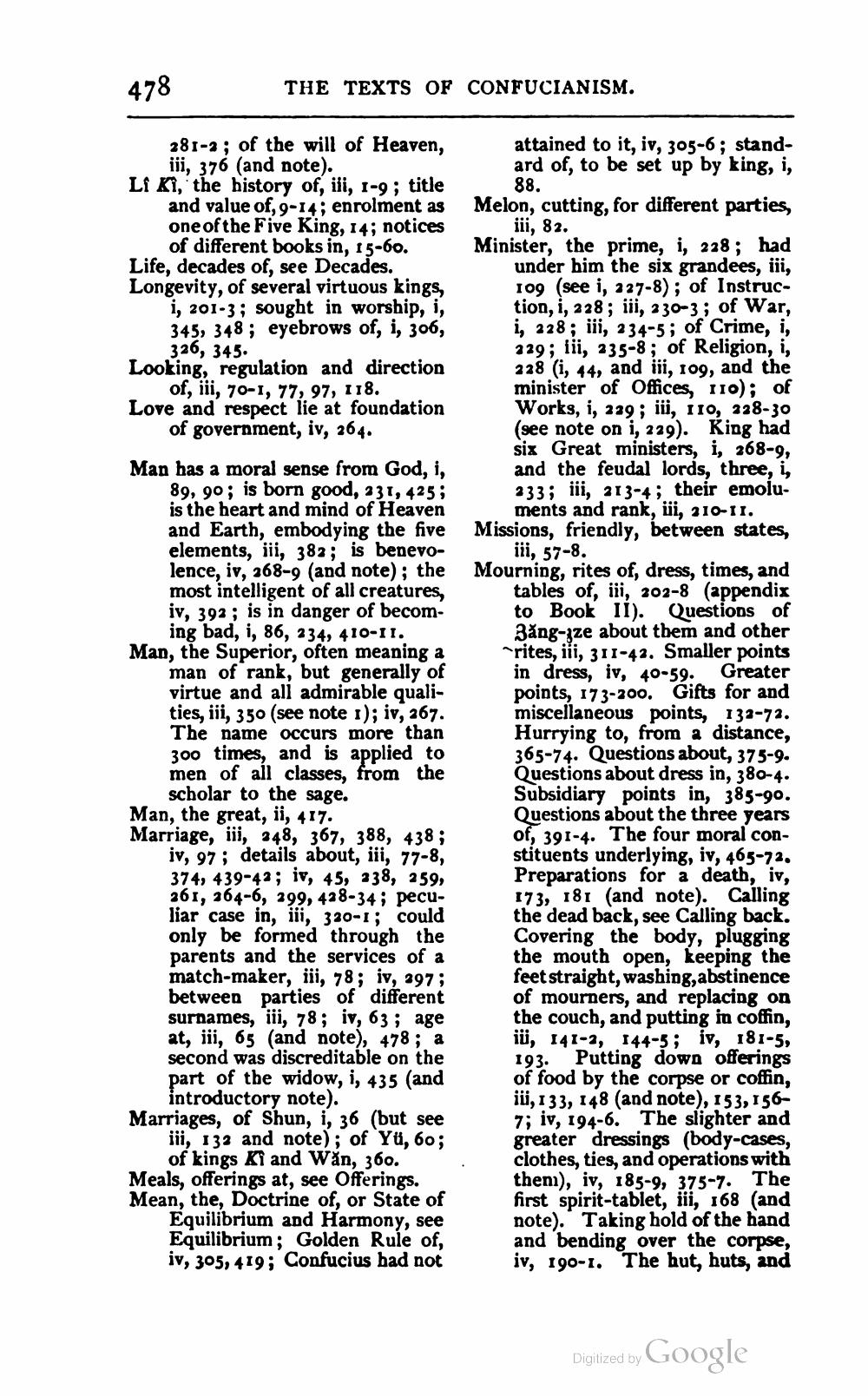________________
478
THE TEXTS OF CONFUCIANISM.
attained to it, iv, 305-6; standard of, to be set up by king, i,
88.
281-2 ; of the will of Heaven,
iii, 376 (and note). Li Ki, the history of, ili, 1-9; title
and value of, 9-14; enrolment as one of the Five King, 14; notices
of different books in, 15-60. Life, decades of, see Decades. Longevity, of several virtuous kings,
i, 201-3; sought in worship, i, 345, 348; eyebrows of, i, 306,
326, 345. Looking, regulation and direction
of, iii, 70-1, 77, 97, 118. Love and respect lie at foundation
of government, iv, 264.
Man has a moral sense from God, i,
89, 90; is born good, 231, 425; is the heart and mind of Heaven and Earth, embodying the five elements, iii, 382; is benevolence, iv, 268-9 (and note); the most intelligent of all creatures, iv, 392 ; is in danger of becom
ing bad, i, 86, 234, 410-11. Man, the Superior, often meaning a
man of rank, but generally of virtue and all admirable qualities, iii, 350 (see note I); iv, 267. The name occurs more than 300 times, and is applied to men of all classes, from the
scholar to the sage. Man, the great, ii, 417. Marriage, iii, 348, 367, 388, 438;
iv, 97; details about, iii, 77-8, 374, 439-42; iv, 45, 338, 259, 261, 264-6, 299, 438-34 ; peculiar case in, iii, 320-1; could only be formed through the parents and the services of a match-maker, iii, 78; iv, 297; between parties of different surnames, iii, 78; iv, 63; age at, iii, 65 (and note), 478; a second was discreditable on the part of the widow, i, 435 (and
introductory note). Marriages, of Shun, i, 36 (but see
iii, 132 and note); of Yü, 60;
of kings Ki and Wån, 360. Meals, offerings at, see Offerings. Mean, the, Doctrine of, or State of
Equilibrium and Harmony, see Equilibrium; Golden Rule of, iv, 305, 419; Confucius bad not
Melon, cutting, for different parties,
iii, 82. Minister, the prime, i, 228; had
under him the six grandees, iii, 109 (see i, 727-8); of Instruction, i, 228; ii, 230-3; of War, i, 228; iii, 234-5; of Crime, i, 229; iii, 235-8; of Religion, i, 228 (i, 44, and iii, 109, and the minister of Offices, rio); of Works, i, 229; iii, 110, 328-30 (see note on i, 229). King had six Great ministers, i, 268-9, and the feudal lords, three, i, 233; iii, 213-4; their emolu
ments and rank, üi, 210-11. Missions, friendly, between states,
iii, 57-8. Mourning, rites of, dress, times, and
tables of, iii, 202-8 (appendix to Book II). Questions of 3ăng-tze about them and other rites, iii, 311-42. Smaller points in dress, iv, 40-59. Greater points, 173-200. Gifts for and miscellaneous points, 133-72. Hurrying to, from a distance, 365-74. Questions about, 375-9. Questions about dress in, 380-4. Subsidiary points in, 385-90. Questions about the three years of, 391-4. The four moral constituents underlying, iv, 465-72, Preparations for a death, iv, 173, 181 (and note). Calling the dead back, see Calling back. Covering the body, plugging the mouth open, keeping the feet straight, washing, abstinence of mourners, and replacing on the couch, and putting in coffin, ii, 141-2, 144-5; iv, 181-5, 193. Putting down offerings of food by the corpse or coffin, iü, 133, 148 (and note), 153,1567; iv, 194-6. The slighter and greater dressings (body-cases, clothes, ties, and operations with them), iv, 185-9, 375-7. The first spirit-tablet, iii, 168 (and note). Taking hold of the hand and bending over the corpse, iv, 190-1. The hut, huts, and
Digitized by Google




